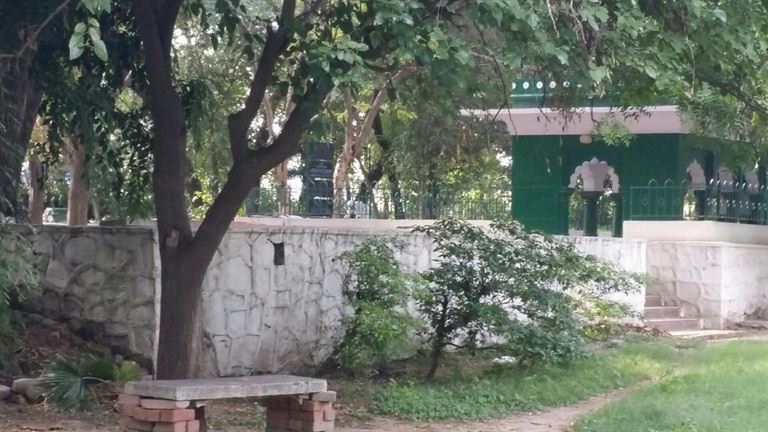Near the Pragati Maidan metro overbridge entrance is a monument which though structurally nondescript is the resting place of one of the greats of mystic Persian poetry.
Mirza Abdul Qadir Bedil (1642-1720) is one of the most respected Afghani poets but popularly known as Bedil Dehlavi . In the early 17th century, his family moved from Afghan Turkestan (Balkh region) to India, to live in the Mughal India. Bedil an ethnic Uzbek, was born and educated in India. He was born in Azimabad , Bihar. He travelled and visited his ancestral lands in his later life.

Harkî raft az dîdah dâghe bar dîl-e mâ tâzah kard
dar zamîn-e narm naqsh pâ nomâyân meshawad
The one who is out of my sight, left a wound in my heart
The soft earth reflects the footprints
Poem by Mirza Bedil
Translated by Nasim Fekrat
He was a poet of the Indian school of Persian poetry. Fortunately his writings have all been preserved and none are lost.
His kulliyat (complete works) consist of many ghazals, tarkib-bands, a tarjih-band, mu’ammas (riddles) and more. He also wrote four masnavis, the most important being “Irfaan”, which he completed at age 68. As the name suggests it outlines his philosophy and philosophical views, along with stories and fairy tales.
He is considered as one of the prominent poets of Indian School of Poetry in Persian literature, and both Mirza Ghalib and Allama Iqbal were influenced by his unique style.
As sign of tolerant times under the later Mughals and his environment rezulted in his having very tolerant views. Like many Indian poets he preferred to side with the common man rather than the clergy
You cannot sip the ocean, if you cannot be like a whale
You cannot gallop up the mountain, if you cannot be like a tiger
the world’s ocean becomes one gulp for you
O the patience of imagination, if you do not lose capacity
دریا نکشی، اگر نهنگی نکنی
بر کوه نتازی، ار پلنگی نکنی
یک جرعۀ تست، قلزم ِ کون و مکان
ای حوصلۀ خیال تنگی نکنی
Daryâ nakashî, agar nahangî nakunî
bar kooh natâzî, ar palangî nakunî
yak jur’a-e tust, qulzam-e kown wa makân
ai hawsêla-e khîyâl tangî nakunî
Poem by: Mirza Abdul Qadir Bedil
Translated by Nasim Fekrat
By nature he was inclined to Sufism and spent time with the Sufi saints of his time. He is considered a Sufi saint by many.e essentially believed that the world was eternal, and in constant motion. He believed that all life was first mineral, then plant, then animal.
A board put up when the President of Tajikistan visited Delhi and came to pay his respects to the mystic poet saint.
Bedil enjoys a cult following in Afghanistan and Tajikistan.
Weekly Bedil meetings were held to study and interpret his poetry, and he was the poet of choice for many ghazal singers (including the most illustrious of all, Ustad Sarahang, who even expressed his desire to be buried at Bedils tomb. This present tomb was restored and renovated for tge visit of tge President of Tajikistan in
O the consumer of the residue of imagination, blessing is something else
You are being vain with illusion; the truth is something else
The paradise that is adorned with gems and gold
It reflects your avarices — the paradise is something else
ای زلـّه کش ِ خیال! نعمت، دگراست
مغرور توهّمی، حقیقت دگر است
خـُلدی که به گوهر و زر آراسته اند
مجموعۀ حرص تست، جنت دگر است
Ai zalla-kashî khiyâl, ne’mat digar ast
maghror-e tawahumî, haqîqat digar ast
kholdî ki ba gawhar wa zar ârâsta-and
majmo’aee heers-e tust, janat digar ast
Poem by: Mirza Bedil
Translated by Nasim Fekrat
However, Bedil is not easy to understand. His language and tjoughts are both complicated with difficult sentence structure
Further reading for Bedil’s poetry
How to reach:
A yellow sign next to the Overbridge near the Pragati Maidan metro leads into the dargah. Its a beautifully wild and unkempt garden
